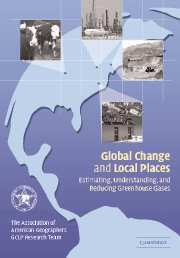Book contents
Preface
Published online by Cambridge University Press: 31 July 2009
Summary
Global Change and Local Places explores the ways people and biota contribute to climate change in localities of the United States. The volume summarizes the findings of the Global Change and Local Places project initiated by the Association of American Geographers (AAG). The Global Change and Local Places project was underwritten by the National Aeronautics and Space Administration's Office of Earth Science to develop methods to answer such questions as: how do local places contribute to global change; how do those contributions change over time; what forces drive such changes; what controls do local residents exercise over such driving forces; and how can locally initiated efforts at mitigation and adaptation be promoted?
Four study areas were selected for environmental and economic diversity and for the local knowledge, scientific competence, and commitment to long-term study on the part of the four academic institutions that participated in the project: Kansas State University (Manhattan, KS), Appalachian State University (Boone, NC), the University of Toledo (Toledo, OH), and the Pennsylvania State University (State College, PA). The four sites offer, respectively, intensive irrigated crop and beef production in Kansas, a mix of forestry and manufacturing in a rapidly growing area of North Carolina, a restructured belt of heavy industry in Ohio, and extensive open-pit coal mining and lime production in Pennsylvania. The sites are local, but not small.
- Type
- Chapter
- Information
- Global Change and Local PlacesEstimating, Understanding, and Reducing Greenhouse Gases, pp. xvii - xviiiPublisher: Cambridge University PressPrint publication year: 2003



